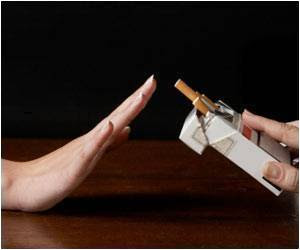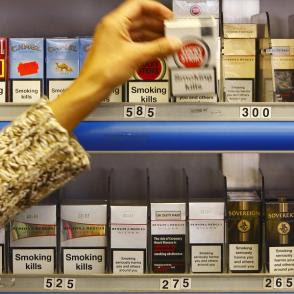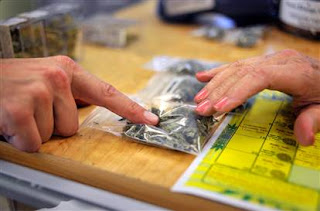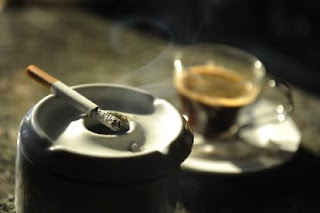
Cooter Brown's Rib Shack is a small restaurant outside of Jacksonville known for its barbeque and extensive beer selection.
Until about four weeks ago, it was also a place where a smoker could light up with abandon.
"Mainly we changed to smoke-free (because) pretty much everybody else was going to it . a lot more places are smoke-free now," said Cooter Brown's owner, Tim Johnson. "And customers would talk about how (the restaurant) got all smoky."
The restaurant is now part of a growing trend to establish anti-smoking policies — policies that might be contributing to decreases in lung cancer rates in the state and country in recent years.
A new study from the Centers for Disease Control and Prevention reports that lung cancer rates across the country have decreased in the past decade and suggests that non-smoking rules, tobacco excise taxes and funding policies to assist smokers in quitting are what have led to the improvement. However, the study also shows Alabama's decreases in lung cancer pale in comparison to other states — a problem some health experts say arises from fewer smoking bans and less anti-smoking funding in Alabama than in other areas of the country.
"It's frustrating . we have not been able to get elected officials as into it as they need to be," said Ginny Campbell, government relations director in Montgomery for the American Cancer Society.
According to the CDC study, lung cancer incidence among men between 1999 and 2005 decreased nationwide by 1.4 percent and between 2005 and 2008 by 2.9 percent. The study also showed that from 1999 to 2008, lung cancer incidence among men decreased in 35 of the 44 states analyzed and remained stable in the other nine states, which includes Alabama.
Among women, lung cancer incidents among women between 2006 and 2008 decreased 2.2 percent after increasing .5 percent between 1999 and 2006. Between 1999 and 2008, however, smoking rates for women increased slightly in the Southeast, including about 1.9 percent in Alabama.
"Other states are reducing faster," said Diane Beeson, director of the statewide tobacco prevention program for the Alabama Department of Public Health. "Smoking is still the leading preventable cause of death in Alabama."
According to the CDC, lung cancer is the most commonly diagnosed cancer and the leading cause of cancer death in the United States. Also, most deaths from lung cancer are caused by cigarette smoking and exposure to secondhand smoke. In addition, smoking can cause coronary heart disease and strokes.
A report compiled by the Institute for Social Science Research at the University of Alabama for the Alabama Department of Public Health shows that the life lost in Alabama due to smoking is significantly high. The report states that in 2009, 8,685 Alabama deaths were attributed to smoking-related diseases. It adds that 15.3 years of potential life were lost, on average, among Alabama adults who died from a smoking-related illness.
The report also lists the financial costs of smoking, indicating that in 2010, $1.66 billion in excess personal medical care expenditures in Alabama were attributed to smoking. It also estimated that $941 million in productivity losses in Alabama in 2010 were attributable to smoking-related illnesses.
"Our smoking rates have gone down, but not as fast as others in the country," said Dr. Donald Williamson, state health officer of Alabama.
Williamson agreed with the CDC that anti-smoking policies, taxes and funding of anti-smoking programs have led to decreases in smoking rates and therefore, fewer incidences of lung cancer.
"But it's never a single intervention, it's all of them combined," he said.
Williamson said one of the best things Alabama could do is create a strong indoor clean air act.
"That would have two effects: it protects non-smokers from second-hand smoke, which does contribute to some lung cancers, and it does serve to discourage smokers," Williamson said. "It will lead to a decrease in tobacco consumption."
Alabama is currently one of only three states without a statewide smoking ban on smoking in indoor public areas, Beeson said.
"We still allow smoking indoors in a lot of places, to say nothing of smoking outdoors," she said. However, the number of Alabama municipalities with anti-smoking ordinances has increased in recent years.
Alabama Department of Public Health data indicates there are about 129 municipalities in Alabama with some type of smoking ordinance. Anniston, Jacksonville, Oxford and Piedmont all have smoking ordinances that prevent smoking in certain public areas. In addition, Anniston's two hospitals, Regional Medical Center and Stringfellow Memorial Hospital, banned smoking from their campuses earlier this year.
"We've been really pleased with the reaction from the public about it," said Mike Sims, vice president of human resources for RMC. "Most people have been very cooperative."
RMC also enacted a program to help employees kick their smoking habits. Sims said 60 employees enrolled in the program in May and about 35 percent were able to completely kick their smoking habit.
"I think that was pretty good," Sims said.
Sims said the hospital planned to make another push to get more employees into the program in a few months.
Another powerful way to curb smoking in the state would be to increase taxes on cigarettes, Campbell said.
"We've been working for years to get the state . to increase tobacco taxes," she said. "Increasing the cost really prevents kids from starting smoking. We like to focus on prevention because once they get started, it's really hard for them to stop."
According to the Institute for Social Science Research at the University of Alabama report, at 42 cents a pack, Alabama has the fifth-lowest excise tax on cigarettes in the nation.
"Even if you added $1, we'd still have a tax that is less than the national average," Williamson said.
However, many local governments in Calhoun County also have various taxes on cigarettes, including Anniston, Hobson City, Calhoun County, Jacksonville, Ohatchee, Oxford, Piedmont and Weaver. The level of taxes varies though. For instance, Oxford has a 3-cent tax for every pack of 20 cigarettes purchased while Jacksonville has a 5-cent tax for every 20-cigarette pack purchased.
Senate president pro tem Del Marsh, R-Anniston, who holds the most powerful position in the state Senate, said he would be opposed to a statewide ban on smoking in public areas or businesses.
"I would not openly support that right now," Marsh said. "If individual companies choose to have smoking bans, that's fine. People have the choice to go in there or not."
Marsh said he was also opposed to raising taxes on cigarettes.
"I'm not going to try to increase taxes at this time," Marsh said.
Unlike Marsh, Jennifer Price, spokeswoman for the Alabama Restaurant Association, said her organization supports only a statewide ban on smoking in public places and not the scatter-shot approach of individual municipalities.
"We support a smoking ban if it's a statewide one with no exclusions . if everyone is on the same playing field," Price said. "If there is one area that has a ban and another nearby that doesn't, we've found that can hurt businesses."
Williamson said a complete statewide ban of the sale of tobacco products similar to bans on other drugs would not be possible. Williamson recently pushed for a statewide ban of the synthetic marijuana product known generally as spice, which has been legal in most of the state for the last couple of years.
"The FDA (Food and Drug Administration) has jurisdiction on tobacco," Williamson said. "We wouldn't be able to just set tobacco as a controlled substance and criminalize it."
To Williamson, outside of taxes and bans, a good way to curb smoking is to continue funding education to youths on the dangers of tobacco. However, again Alabama falls behind many other states in this regard.
"We are grossly underfunded," Beeson said. "The state is funding less than 4 percent on education of what the CDC says we should fund."
Still, it will take increases in taxes and smoking bans, not just more education funding, to truly help Alabama catch up with the rest of the country.
"It's really the synergy among the different policies," she said.








